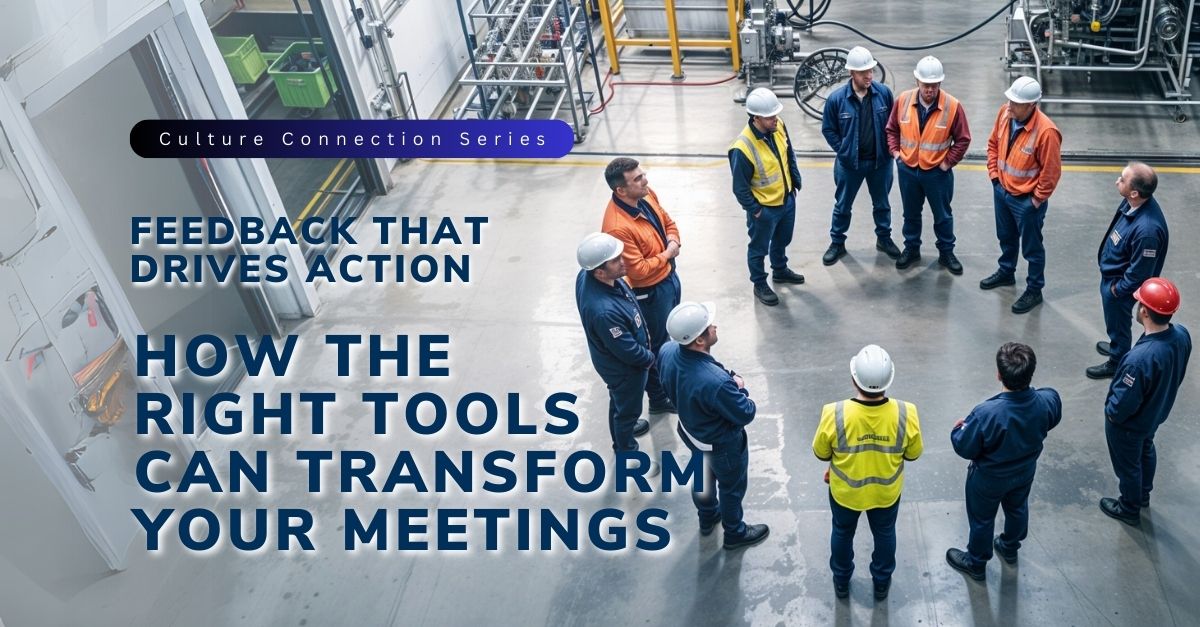
Jason Quinnan, Project Manager, POWERS
Using Feedback Tools to Foster Effective Meetings
Effective meetings are the cornerstone of high-performing teams. They set the stage for clear communication, alignment, and execution. However, not all meetings deliver their intended value. Many fall into the trap of inefficiency, leaving participants frustrated and misaligned. The “Effective Meeting Assessment” provides a structured framework to evaluate and improve the quality of these critical gatherings.
This tool evaluates meetings across four categories—Compliance, Communication, Assignments, and Feedback—and offers actionable insights to enhance performance. Let’s explore how leaders can utilize such tools to drive improvement, foster ownership, and create a culture of continuous growth.
Why Feedback Matters in Meetings
Ken Blanchard, the renowned leadership expert and author of The One Minute Manager, famously said:
"Feedback is the breakfast of champions."
– Ken Blanchard
Blanchard emphasized the value of feedback as a catalyst for growth and improvement, particularly in leadership and team dynamics. Structured feedback mechanisms like the one shared create opportunities to refine behaviors, clarify expectations, and align teams on their goals.
But feedback is only effective when it’s timely, actionable, and focused on the right priorities. Meetings provide the perfect venue to embed a culture of feedback in daily operations.
Breaking Down the Feedback Framework
Compliance
- Why It Matters: Starting and ending meetings on time and having an agenda demonstrates respect for everyone’s time. Attendance shows commitment and accountability.
- Key Actions for Leaders:
- Reinforce punctuality by starting meetings promptly, even if some attendees are late.
- Share agendas in advance to set clear expectations for the discussion.
- Celebrate full attendance as a team win, reinforcing its importance.
Communication
- Why It Matters: Clear and concise communication prevents tangents and ensures focus on the meeting’s purpose.
- Key Actions for Leaders:
- Begin with a brief safety or priority message to set the tone.
- Actively manage side conversations to keep the discussion on track.
- Use visual aids like whiteboards or charts to reinforce key points and improve understanding.
Assignments
- Why It Matters: Clear assignments drive accountability and ensure everyone knows their role in achieving team objectives.
- Key Actions for Leaders:
- Summarize key takeaways at the end of the meeting and confirm task ownership.
- Follow up on assigned tasks in subsequent meetings to ensure progress and completion.
- Ask team members to report on challenges early to prevent bottlenecks.
Feedback
- Why It Matters: Recognizing achievements and addressing performance gaps fosters a culture of growth and accountability.
- Key Actions for Leaders:
- Offer praise publicly for wins, both big and small.
- Address poor performance in private, focusing on behaviors rather than personal criticisms.
- Use examples to make feedback specific, actionable, and relevant.
How Leaders Can Use the Assessment Tool
- Post-Meeting Reviews: Use the tool immediately after meetings to evaluate effectiveness. Highlight areas of success and areas needing improvement in the comments section.
- Rotating Facilitation: Assign facilitation roles to different team members, allowing everyone to develop leadership and ownership skills.
- Monthly Analysis: Aggregate scores to track trends and measure improvement over time. Share insights with the team and adjust meeting protocols accordingly.
Why This Matters
Incorporating feedback tools into meeting practices doesn’t just enhance individual sessions; it transforms the broader culture. Teams begin to approach meetings with more focus, purpose, and accountability, knowing they are part of a system designed for continuous improvement.
Closing Thoughts
Feedback tools like the Effective Start-Up Meeting Assessment empower teams to make every meeting count. By embedding these practices into daily routines, leaders not only optimize meetings but also set the stage for sustained excellence.
“If you want to go fast, go alone. If you want to go far, go together.”
– African Proverb
This feedback loop ensures that teams move together, aligning their efforts and energy toward shared goals. Use it as a foundation to transform meetings from time-fillers to value-drivers.
Effective Start-Up Meeting Assessment
PDF (1.18Mb)
- Speak to an Expert: Call +1 678-971-4711 to discuss your specific challenges and goals.
- Email Us: Get tailored insights by emailing info@thepowerscompany.com
- Request an Assessment: Use our online contact form, and one of our expert manufacturing consultants will reach out to schedule an in-depth analysis of your operations.

